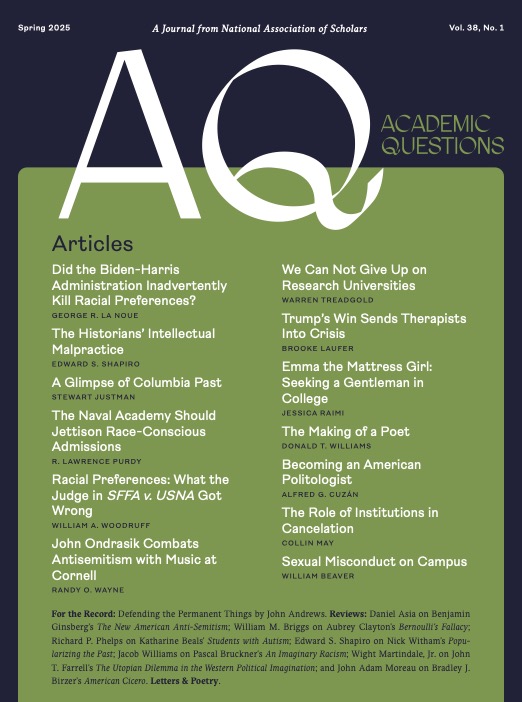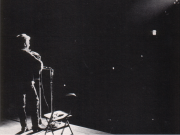American Cicero: The Life of Charles Carroll, Bradley J. Birzer, 2024, Regnery Gateway, pp. 197, $25 hardcover.
A highlight of Bradley J. Birzer’s fine work is that it reminds one that American history cannot be used up. The yearly outpouring of solid titles is evidence of that. That also can be said of the large number of remarkable figures who are forgotten or little remembered. Think of Hugh Mercer, who was perhaps the most outstanding Revolutionary War general. Or Thomas Fortune Ryan, the nineteenth century mountebank. With slight effort one can get to ten names.
A name one could pick is that of Charles Carroll (1737-1832) of Carrollton (his estate), the only Roman Catholic signer of the Declaration of Independence (two days after the signing, since he was late getting to Philadelphia). Few today know the name or anything about him. Yet there was deeply felt praise everywhere in the country upon the death at age ninety-five of the last surviving signer.
Birzer’s intellectual history is in the publisher’s series Lives of the Founders. Other books so far are on John Dickinson of Delaware, Luther Martin of Maryland and Gouveneur Morris of New York. Birzer is professor of history at Hillsdale College and holder of the Russell Amos Kirk Chair in American Studies. Among well received books by him are In Defense of Andrew Jackson and J.R.R. Tolkien’s Sanctifying Myth: Understanding Middle Earth. Before proceeding with this review, a reward awaits you by going to a charming lecture on Carroll by Birzer. Google these words: Youtube Bradley Birzer talk on Charles Carroll. Click on the entry with the caption “The Intelligent Conservative.” You will get Birzer at the Hauenstein Center for Presidential Studies.
How was it that Carroll was even part of the broiling events of his time? In the Colonies anti-Catholicism was ingrained in public opinion and in the law. Although something like 8 percent of Marylanders were Catholics, they technically were not citizens. Until 1774 Carroll could not vote, bear arms, hold office or speak in court. Maryland was founded by Lord Calvert, a Catholic, but with the 1688 Glorious Revolution, Anglicanism became the state religion and virulent anti-Catholicism became the coin of the day.
Part of how Carroll was so much a man of the times is not complicated. Aside from possibly being by 1776 the richest man in the Colonies he was esteemed everywhere for his writings, his manners, and his generosity. Think of Carroll as graced with qualities of the Colonial version of a conscientious aristocrat, as were such Founders as Washington. Carroll was on speaking terms with him and all sorts of men of the day. Although strongly anti-Rome, John Adams admired and liked Carroll. Persons such as Alexander Hamilton, Dickinson, with whom he studied law in England, and Benjamin Franklin may be named here also.
A reader might like Birzer’s book because of the “I-didn’t-know-that” elements. The one which appeals to me most is that the Continental Congress sent to Canada a commission whose charge was to get Quebec to join the Colonies. The commissioners were Franklin, Charles Carroll, his cousin, Father John Carroll, and another Marylander, Samuel Chase. The trip was a fiasco, ably described by Birzer, but the commissioners were not blamed for this. They were able to get home and Carroll’s report about conditions and opportunities in Quebec, was considered valuable.
By the time Adams proposed Carroll as a member of the commission Carroll had become widely known and respected. This was in part because debates he had participated in in the Maryland Gazette were re-printed elsewhere in the Colonies to wide acclaim. In the debates with the pen name “First Citizen,” he asserted eloquently that Parliament was an abuser, that the Colonies had a right to assert and protect their rights, and that the executive could not levy taxes, only the legislature. Taxing people without their consent, Carroll said, “is a measure striking at the root of all liberty.” Further, Carroll had been a prominent member of Maryland’s Committee of Correspondence and had, Birzer says, single handedly led Maryland to declare independence before the thirteen colonies together did.
Carroll’s father, Charles Carroll of Annapolis, became wonderfully wealthy as a planter, owner of a Baltimore iron works, and lawyer. Like the son, the father was a devout Catholic. Young Charles was educated partly in France, partly by English Jesuits there, and for the bar in England, where he became a friend of Edmund Burke.
Carroll was a fervent admirer of the English constitution and like many men of the day thought of himself as defending the traditional English constitution. He returned to Maryland a true American who, as many of his contemporaries, had no wish to turn away from English constitutional law. As he grew more and more known in the public sector, as Birzer shows, Carroll in the years of turmoil argued that the problems and wrongs were the result of Parliament not doing its job. He argued that the troubles the Patriots were causing were the results of unjust actions by Parliament.
The picture of this man in the briar patch of his day is intriguing. Birzer explains that his engagement was not with the Enlightenment. He would, Birzer said in an interview, have had no fondness for Locke, who aside from being anti-Catholic, said man is born with a blank soul. Birzer tells us that Carroll was formed by the classics. Cicero was his lifelong favorite writer, read again and again. Birzer tells us Carroll comes into manhood as a Christian Humanist. He is formed by Thomas Aquinas, who in “On Kingship” says a true leader serves others, not himself, and by a range of other greats. From this formation, says Birzer, comes a man who believes not in the divine right of kings but the divine duty of kings.
He also comes into manhood distrustful and wary, as were most of his peers, of democracy, a man who said if he had to choose between a society of religious freedom but state control a-la-France, or a land with religious tyranny but civil liberty a-la- Britain, his preference was Britain. Long before 1776 he favored independence but not through violence and he had, Birzer says, quoting a letter from Carroll to his father, a horror of civil war. One thing which made his solid reputation was what was generally seen as fair-mindedness and reasonableness. For example, he said it was wrong to call the British enemies, and he futilely fought against the taking of the property of Loyalists.
In an interview with Birzer I learned that Carroll gave some of the land which became the District of Columbia. (There is a Carrollton metro stop.) During the Revolution he spent his own money for Irish Catholics to come to America to fight with the Patriots. He was a founder of what became Georgetown University. He and his father shared a deep mutual love and respect for one another. Alas, the sweetheart to whom he was engaged died before they were to be married. The woman who became his wife bore seven children, of whom three lived to adulthood.
The painting of Carroll reproduced on the wrap around cover of American Cicero and other portraits show a dignified, elegant, and handsome man. He liked fencing and dancing. He bred horses and raced thoroughbreds. He was a slaveholder who favored the elimination of slavery. He said, “Why keep alive the question of slavery? It is admitted by all to be a great evil.” He was also active in two organizations working to transport blacks to freedom in Africa.
Visitors found him a charming and gracious host, one who in old age still wore the knee breeches of his time and not trousers which had become popular. One visitor was surprised when Carroll popped out of his chair and escorted him downstairs to the front door for a goodbye. To the visitor’s concern for the old gentleman’s well-being, Carroll said, Nonsense! He’d ridden sixteen miles on horseback that morning and might do another sixteen that afternoon. He was Maryland’s first U.S. senator but when Maryland passed a law in 1792 saying one could not serve in both the state and U.S. senates, he chose Maryland.
Alexis de Tocqueville visited him in 1831 and found him informed, sharp, and likable. Birzer gives us this quote from Tocqueville who said Carroll represented the end of a period of history: “This race of men is disappearing now after having provided America with her greatest spirits. With them the tradition of cultivated manners is lost; the people becoming enlightened, attainments spread, and a middling ability becomes common.”
Tocqueville’s book was about social democracy. Few in those days favored universal male suffrage. No one would have imagined an event like the 1840 presidential election when political democracy began to take hold. Birzer says that although by his old age Carroll may not have been resigned to the idea of democracy, he remained to his end optimistic about the Republic and believed that the Constitution was a great thing. What Birzer tells us about Carroll views on democracy is valuable because such views were widely held at the time.
In sum: The form of government which the new nation had was by definition superior to any kind of democracy. Proponents of “extreme populism and democracy,” as Birzer puts it, “had no cares for the common person whatsoever.” Such persons were demagogues who sought to flatter for their own purposes and aggrandizement. Democracy was an expression of the “goodwilled ignorance of the many.” Democracies encourage irrationality. In the book there is more on Carroll's beliefs about democracy than I relate here but I think my summary suffices. It is worth noting that Carroll was never a ranter or an hysteric. Rather, he was smooth, civil, sane, wise.
In the interview Birzer said that what Carroll bequeaths to our age is what he said about virtue and the ways Carroll addressed the subject. Men are to act through virtue and the proper action of a man is to better one’s soul and one’s society. A true aristocrat offers his wealth, his time, and his talents for the stability of the community and its citizens. There can be no liberty unless there is order in society and unless there is virtue in men. There are dire consequences when men make their appetites be what is most important to them. A republic can succeed only if men make sacrifices. Virtue is far better than wealth.
Birzer quotes Carroll on the Constitution: “Its true spirit and full vigor cannot be preserved without the most watchful care and strictest vigilance of the representatives over the conduct of the administration.” Good men, he said, recognize the temptations that plague all men and they must recognize the temptations can increase. Government power is intoxicating and can pull into an ever-tighter circle of corruption. “The pursuits of government in the enlargement of its powers and its encroachments on liberty, are steady, patient, uniform, gradual,” he argued. The antidote: virtue and vigilance, primarily by promoting balance in government.
Birzer’s portrayal of Carroll on the matter of virtue, slightly covered in this review, is worth the reader’s attention because Birzer presents a sharp insight into the period. Carroll was not off in a different galaxy talking rarefied hopes. He may have been exotic in his beliefs but many of his contemporaries were versed in the classics, although classics different from those which formed Carroll. One might recall the historian G.M. Trevvelyan saying that in the seventeenth century men in public life quoted the Bible and in the eighteenth century the classics.
Because American Cicero is admirably written, the reader can cope easily with the range of matters on offer, especially the debates Carroll found himself engaged with. The title of Birzer’s book could have been almost any other sensible one. The one he chose fits because men of the day—Adams and Jefferson, for example—admired the Roman for his elegant writing and republican notions. Birzer finds Ciceronian ways of thinking in Carroll’s writings. As noted, all his adult life Carroll reread Cicero. So, the title also fits because Birzer doesn’t consider Carroll “The” American Cicero of his times. I closed the book grateful that I was gifted an American little remembered whose life and career rewarded my attention. As I end this review, I think of what Carroll said in 1828:
That the republic created by the Declaration of Independence may continue to the end of time is my fervent prayer.
John Adam Moreau, a history Ph.D. from the University of Virginia, has been a longtime reporter and editor for major daily newspapers; [email protected]. He is the author of Randolph Bourne, Legend and Reality (Public Affairs, 1966) and of published essays on such subjects as Huey Long, Francisco de Miranda, and Heywood Broun. He last appeared in AQ in winter of 2024 with “The Necessity of What Came Before,” a review of Tracy Lee Simmons’ On Being Civilized: A Few Lines Amid the Breakage.
Photo by Michael Laty (died 1848) - Maryland Online Encyclopedia, Public Domain, https://commons.wikimedia.org/w/index.php?curid=11192839














